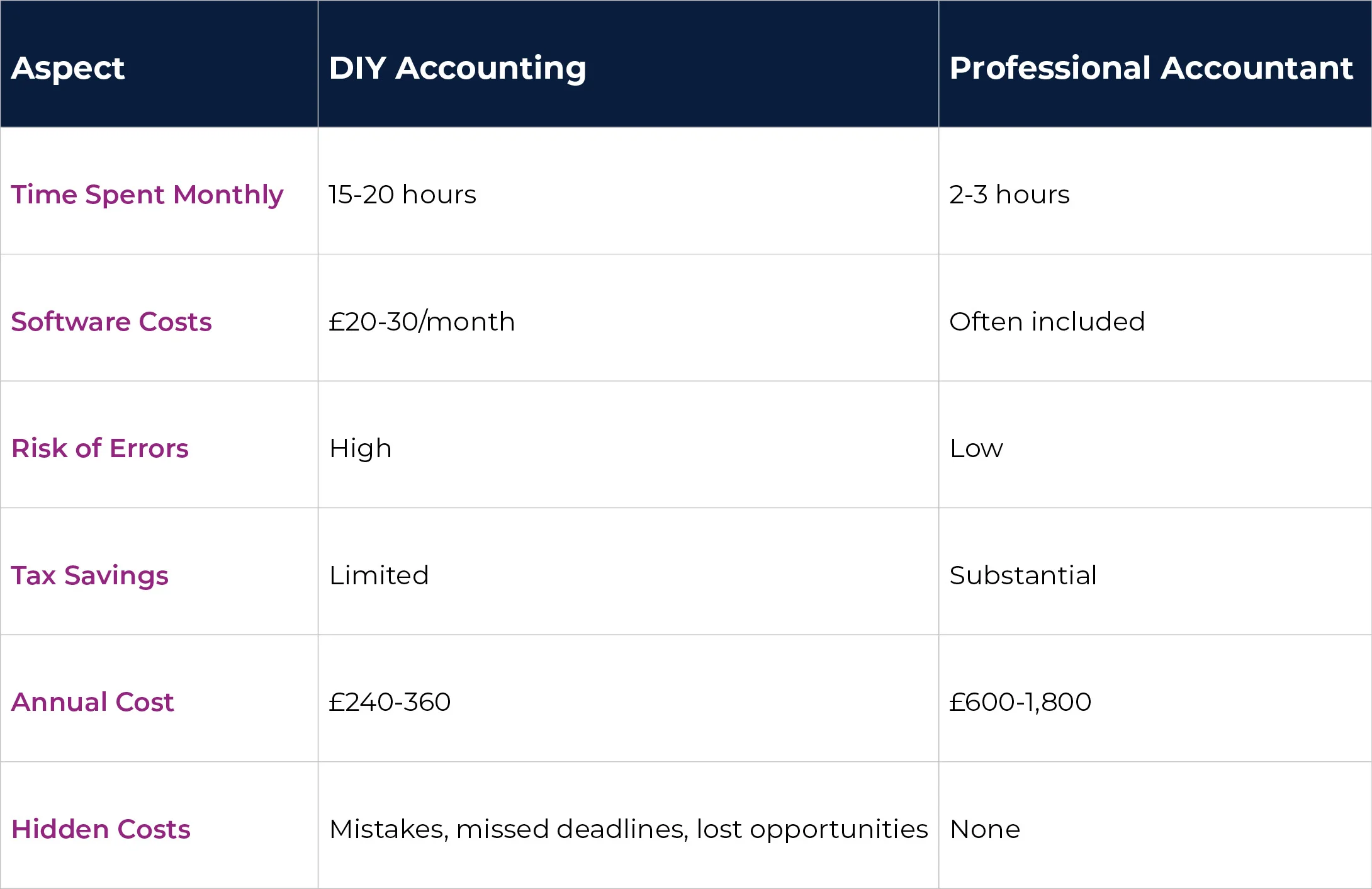According to the Office for National Statistics (ONS), there are approximately 4.2 million self-employed workers in the UK as of 2023, and a recent Federation of Small Businesses survey found that 40% list tax compliance as their biggest financial concern. Running your own business takes courage and skill – but you don’t have to handle everything alone. Having an accountant for self employed business owners isn’t just about the numbers; it’s about having a trusted advisor who helps your business grow.

Do I Need An Accountant As A Sole Trader?
Many sole traders start by handling their own accounts. After all, you’re good with numbers and there’s plenty of software available. But as your business grows, so do your financial responsibilities. HMRC requirements become more complex, and mistakes can be costly.
Signs you might need professional help:
- You’re spending hours on bookkeeping instead of growing your business
- Tax deadlines feel overwhelming
- You’re unsure about claiming expenses
- Your income is increasing and you want to be tax-efficient
- You’re considering VAT registration
A professional accountant does more than just file your tax return. They help you:
- Plan for tax efficiently
- Identify legitimate expenses
- Meet legal requirements
- Make informed business decisions
- Save money in the long run
The True Value Of Professional Accounting Support
When you’re self-employed, every pound counts. Many business owners hesitate to hire an accountant, seeing it as an unnecessary expense. However, professional tax advice often pays for itself through tax savings and improved financial management.
Consider this: The average self-employed person spends 15 hours per month handling their accounts. That’s time you could spend serving customers, developing products, or growing your business. Professional accountants bring efficiency and expertise to your financial management.
Key Services Your Self-Employed Accountant Provides
Professional accountants offer much more than tax returns. Here’s what a qualified accountant can do for your self-employed business.
Tax Return Preparation and Filing
An accountant ensures your self-assessment tax return is accurate and submitted on time. They help you:
- Calculate your tax liability correctly
- Identify all allowable expenses
- Meet HMRC deadlines
- Avoid costly penalties
- Plan for tax payments
Bookkeeping and Financial Management
Proper bookkeeping is the foundation of good business management. Your accountant can:
- Set up efficient systems for:
- Invoice tracking
- Expense recording
- Receipt management
- Cash flow monitoring
- Financial reporting
Business Growth Planning
A good accountant becomes your business advisor, helping you make informed decisions about:
- Business structure options
- Growth opportunities
- Investment decisions
- Funding needs
- Profit improvement
When To Hire An Accountant
Certain business milestones often signal it’s time to seek professional help:
Starting Out
- Setting up proper financial systems
- Choosing the right business structure
- Understanding tax obligations
- Planning for growth
Growing Your Business
- Approaching the VAT threshold
- Taking on employees
- Seeking funding
- Expanding services or locations
Complex Situations
- Multiple income streams
- International clients
- Property investments
- High-value contracts

Finding The Right Accountant For Your Business
Look for these qualities when choosing an accountant for self employed support:
Qualifications and Experience
- Professional certifications
- Industry knowledge
- Small business expertise
- Technology proficiency
- Good communication skills
Location and Accessibility
While “accountant for self employed near me” might seem like the obvious search, consider that many accountants now work effectively with clients remotely. What matters most is:
- Regular communication
- Timely responses
- Clear advice
- Proactive support
- Technology use
Cost Considerations
Accounting fees vary based on:
- Services required
- Business complexity
- Transaction volume
- Meeting frequency
- Additional support needed
Understanding the True Cost Comparison

Typical services included in your accounting fees might include:
- Monthly bookkeeping
- Quarterly reviews
- Tax returns
- VAT returns
- Year-end accounts
When evaluating costs, consider the value of your time. Those 15-20 hours spent on DIY accounting each month could be invested in growing your business instead. Professional accountants also help identify tax savings that often exceed their fees, making their services a smart investment rather than just an expense.
Remember that fees should be transparent and agreed upon upfront. Many accountants offer different service packages to suit various business needs and budgets. Some provide monthly payment plans to help manage cash flow more effectively.
Working Effectively With Your Accountant
To get the most value from your accountant:
Keep Good Records
- Track all income and expenses
- Save receipts and invoices
- Document business transactions
- Maintain organized files
- Use recommended software
Communicate Regularly
Share important information about:
- Business changes
- New contracts
- Major purchases
- Financial concerns
- Growth plans
Best Practices For Self-Employed Accounting
Even with professional help, you should understand basic accounting principles:
Essential Records to Keep
- Sales and income
- Business expenses
- Bank statements
- Contracts
- Asset purchases
Digital Tools
Modern accounting often uses:
- Cloud accounting software
- Receipt scanning apps
- Invoice management systems
- Time tracking tools
- Payment processors
Planning For Growth
Your accountant helps you prepare for business evolution:
- Structure changes
- Expansion plans
- Tax efficiency
- Investment opportunities
- Succession planning
They can advise on:
- Business loans
- Asset purchases
- Hiring decisions
- Market expansion
- Risk management
The Future Of Self-Employed Accounting
Digital transformation is changing how self-employed individuals manage their finances. Your accountant should help you:
- Adapt to Making Tax Digital
- Use cloud accounting effectively
- Automate routine tasks
- Access real-time financial data
- Make data-driven decisions
Taking Action
Finding the right accountant for self employed support is crucial for your business success. They should:
- Understand your business needs
- Provide clear communication
- Offer proactive advice
- Use modern technology
- Deliver value for money
Ready to focus on growing your business while an expert handles your finances? Contact us to discuss how we can support your self-employed business.
We’ll help you:
- Set up efficient systems
- Plan for tax
- Manage growth
- Make informed decisions
- Stay compliant
Remember, professional accounting support isn’t just about compliance – it’s an investment in your business’s future.
FAQs
Do I legally need an accountant as a self-employed person?
No, it’s not legally required, but professional help often saves money and time while ensuring compliance with HMRC regulations.
Can I switch accountants if I’m not happy with my current one?
Yes, you can switch at any time. A professional accountant will help manage the transition and transfer of your financial records.
What’s the minimum income level where I should consider getting an accountant?
There’s no set minimum – consider factors like time spent on accounting, complexity of your finances, and growth plans rather than just income.
Do I need an accountant if I use accounting software?
While software helps with basic bookkeeping, an accountant provides strategic tax advice and ensures compliance that software alone can’t offer.
Can an accountant help me save money on taxes?
Yes, accountants identify legitimate tax deductions and help structure your business finances efficiently to minimize your tax liability.
What’s the difference between a bookkeeper and an accountant?
Bookkeepers record daily transactions, while accountants provide strategic advice, tax planning, and ensure legal compliance.




